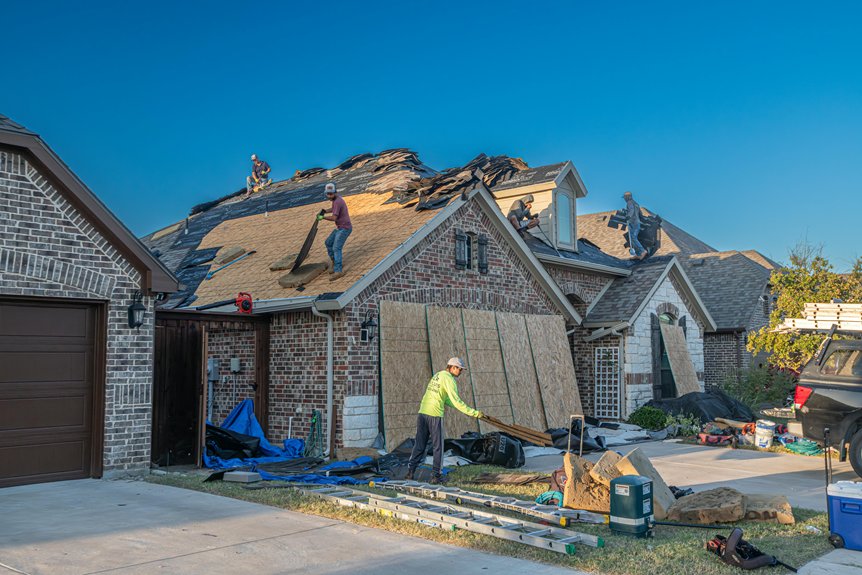When planning a commercial roof replacement in Argyle, understanding the factors that influence costs is vital for accurate budgeting and project management. Variables such as roof size, material choice, and building complexity can markedly impact the overall expense, while additional factors like permits and labor rates also play a role. To guarantee your project stays within budget and meets all requirements, it’s essential to evaluate these elements carefully before obtaining detailed estimates from local contractors.
Factors Influencing Commercial Roof Replacement Costs in Argyle
Several key factors directly impact the cost of commercial roof replacement in Argyle, with material selection, roof size, and structural complexity being the most significant. Maintenance schedules influence overall expenses, as more durable materials typically require less frequent upkeep, reducing long-term costs. Utilizing customer-focused service providers like Top View Roofing can also affect the overall experience and cost-efficiency of the replacement process. Material durability directly affects upfront investment and longevity; high-durability options tend to have higher initial prices but lower ongoing maintenance expenses. The roof’s size impacts material quantities and labor efforts, increasing costs proportionally. Structural complexity, including features like multiple penetrations or unique architectural designs, demands specialized labor and materials, driving up expenses. Understanding these factors helps you evaluate the trade-offs between initial costs and long-term savings, ensuring a replacement that balances durability, maintenance, and budget constraints.
Average Price Ranges for Different Roofing Materials
The cost of roofing materials varies considerably based on their composition, durability, and installation requirements, directly affecting the overall expense of commercial roof replacement in Argyle.
For example, thermoplastic polyolefin (TPO) membranes typically range from $5 to $8 per square foot, offering moderate durability and ease of installation. Built-up roofing (BUR) systems cost between $4 and $9 per square foot, with material durability influenced by membrane layers and aggregate surfacing.
Metal roofing, known for high durability, usually costs $8 to $15 per square foot, reflecting material quality and contractor experience. The skill level of your contractor impacts installation costs and quality, especially with complex materials.
Selecting the appropriate material involves balancing durability expectations and budget constraints to optimize long-term performance and expense.
Impact of Roof Size and Building Complexity on Expenses
As roof size and building complexity increase, so do the associated replacement costs due to the greater material requirements, labor efforts, and installation intricacies involved. Larger roofs demand more roofing material, directly elevating material costs.
Complex building features, such as multiple levels, HVAC systems, or unique architectural elements, complicate installation, requiring specialized techniques and potentially extending project duration.
Your choice of roof material impacts costs; premium materials like TPO or modified bitumen may require additional labor and handling.
Contractor experience considerably influences expenses, as seasoned professionals can efficiently navigate complex projects, reducing labor time and minimizing errors.
Ultimately, larger, more intricate structures necessitate detailed planning, precise execution, and higher investment to ensure durability and compliance with building codes.
Additional Costs to Consider During a Replacement Project
Beyond the direct costs of materials and labor, numerous additional expenses can influence the total price of a commercial roof replacement. Warranty considerations are vital; opting for extended or premium warranties can substantially increase upfront costs but provide long-term protection against defects and leaks.
You should also budget for permit fees required by local authorities, which vary depending on project scope and jurisdiction. Permit fees ensure compliance with building codes and safety standards, and delays or additional inspections can add to overall expenses.
Other potential costs include debris disposal, site safety measures, and temporary power or equipment needs. Carefully evaluating warranty options and understanding permit requirements helps you avoid unexpected expenses, guaranteeing your project stays within budget while meeting all regulatory and quality standards.
How to Budget Effectively for Your Commercial Roof Replacement
To budget effectively, you need to accurately assess your roof’s replacement needs by evaluating its current condition and material requirements.
Next, estimate the total costs by factoring in materials, labor, permits, and potential delays, ensuring a thorough financial plan.
Finally, allocate funds for contingencies to address unforeseen issues that may arise during the project.
Assessing Replacement Needs
How can you accurately ascertain the scope of your commercial roof replacement to ensure your budget reflects the project’s true costs? Begin with a thorough roof inspection, focusing on identifying structural issues, membrane deterioration, and areas of material failure.
Evaluate the material durability of existing roofing components—older materials may require more extensive replacement or reinforcement. Document all signs of damage, including leaks, punctures, or blistering, to determine whether repairs are feasible or full replacement is necessary.
Consider the roof’s age and previous maintenance history, as these factors influence replacement urgency and scope. Precise assessment prevents underestimating costs and ensures your budget accounts for necessary upgrades, replacement of compromised materials, and adherence to current building codes.
Estimating Total Costs
Accurately estimating the total costs of a commercial roof replacement requires a detailed understanding of all potential expenses involved. Beyond the initial installation, consider ongoing roof maintenance costs, which impact your budget over time.
A thorough estimate should include materials, labor, permits, and disposal fees. Additionally, warranty coverage plays a vital role in long-term financial planning; a robust warranty can offset future repair costs and reduce unforeseen expenses.
Be sure to account for the scope of warranty coverage, including duration and what’s covered, to avoid surprises. Precise budgeting involves analyzing these components carefully, ensuring you allocate funds for both immediate replacement costs and future maintenance or repairs that may arise during the warranty period.
Planning for Contingencies
Effective budgeting for your commercial roof replacement requires incorporating contingency funds to address unforeseen issues that may arise during the project. Unexpected conditions, such as hidden structural damage or moisture intrusion, can increase costs, making it essential to allocate 10-15% of your total budget for contingencies.
Additionally, planning for potential insurance claims related to storm damage or accidents ensures swift financial recovery if complications occur.
Consider the environmental impact of materials and disposal methods, as regulatory compliance might introduce additional costs.
Proper contingency planning minimizes project delays and cost overruns, safeguarding your investment. By anticipating these variables, you create a realistic budget that accommodates surprises, maintains project momentum, and ensures a successful, environmentally responsible roof replacement process.
Tips for Getting Accurate Quotes From Local Contractors
To obtain precise roofing replacement quotes from local contractors, it’s essential to provide thorough and specific project details. Clearly outline your roof’s size, slope, current materials, and any structural issues.
Confirm contractors review your existing roofing warranties to confirm coverage and avoid redundant costs.
Verify each contractor’s licensing to guarantee compliance with local regulations and proper accountability.
Request detailed proposals that specify labor, materials, and timelines, and compare these for consistency.
Avoid vague estimates; instead, ask for itemized quotes to identify potential discrepancies.
A reputable contractor will offer transparent information and be willing to discuss how their warranty policies and licensing ensure quality and durability.
This level of detail minimizes surprises and leads to more accurate, reliable cost assessments.
Conclusion
To ensure your commercial roof replacement in Argyle stays within budget, thoroughly assess material options, understand the project scope, and obtain detailed, written estimates from reputable local contractors. Consider the long-term savings offered by durable materials and account for potential additional costs such as permits or repairs. Proper planning and clear communication are essential for a successful, compliant, and cost-effective replacement, minimizing unexpected expenses and ensuring your property’s roof performs reliably for years to come. For more information on how to schedule your free roof inspection, call us at (405) 543-2920 or visit us online at Top View Roofing.


















